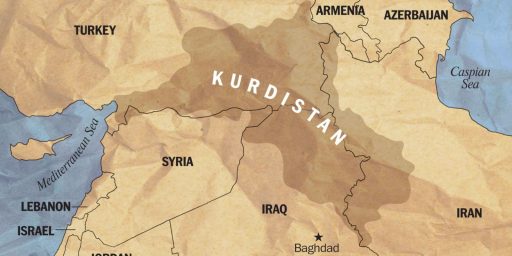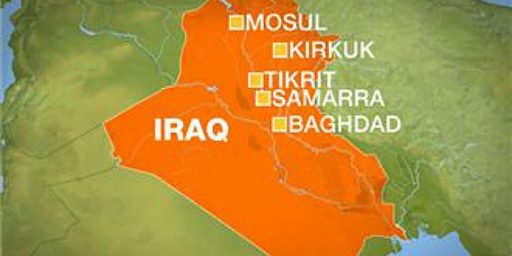Iraqi Democracy
NYT – Early Steps, Maybe, Toward A Democracy In Iraq [RSS]
Whether democracy is really coming to Iraq, or whether it is even possible here, seemed of no immediate concern to Dr. Ahmad Abu-Raghif, a physician in Baghdad. He was game anyway. He showed up at a university hall here on Sunday with a good haircut, a blue suit and a big smile: the outfit of the office-seeker worldwide. He buttonholed 50 people, he said, at the grass-roots caucus, making the pitch for their votes. “I explained myself to a lot of people,” Dr. Abu-Raghif, 37, said before the voting began. “I have a Ph.D. I am a city council member. And I think I am a good candidate to win.” Plus he had personal connections, which never hurt.
“Some of them are my patients,” he confided.His Western-style vote-corralling is part of what may become the birth of democracy in Iraq, something that never really existed here. As with much in Iraq since the American invasion, the experiment is at once inspiring and troubled, full of potential but not at all assured of success. Caucuses like the one Dr. Abu-Raghif attended have been convening around Iraq to select roughly 1,000 delegates, who will hold a national conference in Baghdad in the next week.
The concrete goal of the conference is to vote – openly and freely – on a 100-seat transitional council that will oversee the government of Iyad Allawi, the interim prime minister, until national elections are held in January. But the conference is also meant to function as an opportunity for a national dialogue, in which for the first time since the fall of Saddam Hussein, Iraqis from all religions, regions and political and ethnic groups begin to discuss the way forward.
With widespread violence and fragmentation, that has turned out to be difficult, so much so that the United Nations is urging Iraq to postpone the conference at least briefly. A thousand or more fledgling politicians make a tempting terror target, aside from the many logistical challenges – as basic as where everyone will sleep – that surround such a big event. But the major issue is that many groups considered crucial to any broad national dialogue are refusing to take part, largely because they view the process as controlled by the United States. Wamidh Nadhmi, a newspaper editor and a leader in two nationalist parties that are refusing to attend, said exercises like the conference seemed aimed more at “public opinion in America to tell them that authority was passed to the Iraqi people.” “This argument might help Mr. Bush in his election, but the change is very little in Iraq,” he said. “We do not want to be part of this American solution.”
A mixed bag, to be sure. Certainly, though, an improvement over the previous system. Of course, one major problem will be the lack of a federal style power sharing arrangement:
LAT – Kurds Wonder Where They Fit In The New Iraq
Since the hand-over of power to a new Iraqi government, many Kurds are asking themselves whether the bargain made by their political leaders to rejoin the rest of Iraq after 13 years of semi-independence is really worth it. At the very least, Hassan said, Kurds must demand more equality and autonomy than is on offer. To him, independence would be better. But many political leaders here say their Arab compatriots aren’t taking their concerns seriously. When Iraqi leaders signed a temporary constitution in March guaranteeing Kurds veto power, some Shiite Muslim politicians refused to attend the ceremony. After pressure from Shiite religious leaders, the U.N. resolution ratifying the hand-over did not even mention the temporary constitution.
Incensed Kurds see many Arabs as ungrateful for the Kurds’ efforts alongside the Americans to overthrow Saddam Hussein. “Immediately after the liberation of Iraq, the people here were very happy and proud of their achievements and the gaining an important place in the governing bodies of Iraq,” said Hassan, a sports official in the Kurdistan government. “But after the incident with the U.N. resolution, they became impatient because their concerns were not answered…. Kurds and the peshmerga [fighters] took part effectively in the liberation war, but what we got back was not as much as we put in.”
At the heart of the discontent, he said, is that Arabs treat the Kurds — who are ethnically and linguistically different — as “little brothers.” For instance, although Kurds were awarded eight posts in the new interim government of Prime Minister Iyad Allawi, including a deputy premiership, there was a consensus that the top two positions, the prime ministership and the presidency, would go only to Arabs. Kurds make up about 20% of Iraq’s 25 million people.
Also, Kurds’ wishes to absorb the city and province of Kirkuk into their regional administration have been deferred indefinitely. The strategic, oil-rich city was predominantly Kurdish and Turkmen until Hussein’s government resettled large numbers of Arabs there. “They are all the time going on about their rights. Why are they not ready to recognize the rights of others?” Hassan said of the Arabs.
Allawi, whose government took over from the U.S.-led coalition June 28, visited Kurdistan on July 11, meeting with the two most prominent Kurdish politicians, Jalal Talabani and Massoud Barzani. He came away with a promise of security help from the formidable peshmerga forces — 55,000 fighters strong — who officially are being distributed among the new national Iraqi army, police and border guard. But the peshmerga — whose name means “those who face death” — are likely to remain an army within the army. No one doubts that they could be quickly recalled to fight for Kurdistan if summoned. In fact, they still wear a patch of the Kurdish flag, not the official Iraqi flag, on their uniforms.
Aside from a very strong federalism or independence, it is still not clear to me how the Kurds’ needs can be addressed. They will always be outvoted in national elections and, given their strong nationalism and sporadic history of quasi-independence, they are unlikely to accept that for long.



